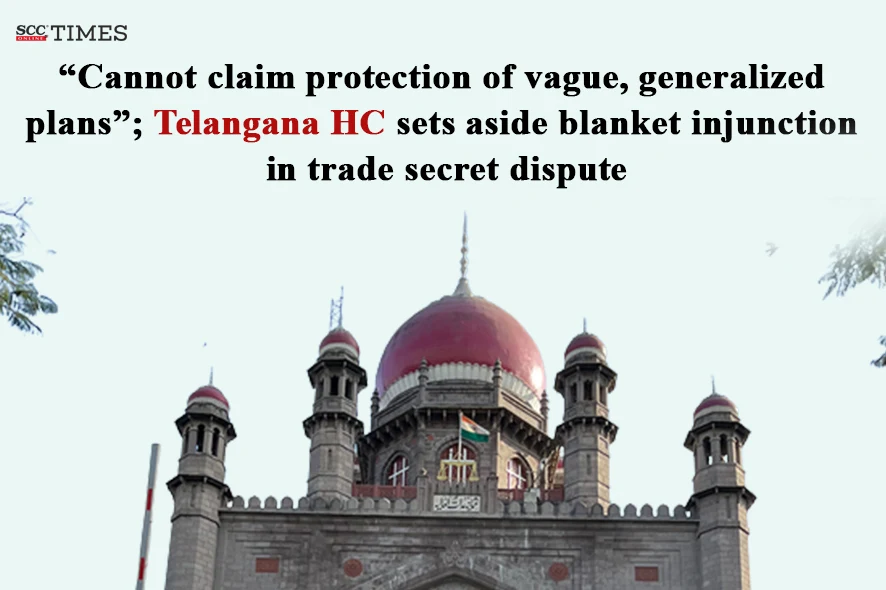Telangana High Court: In an appeal arising out of an order dated 3-10-2024, wherein the commercial Court had granted a temporary injunction restraining the appellants from causing breach of confidential information through commercial exploitation and dissemination of any proprietary confidential information, the Division Bench of Moushumi Bhattacharya* and Gadi Praveen Kumar, JJ, opined that a claim of trade secret infringement required that the information claimed to be a trade secret is clearly identifiable, defined and specific. Thus, the Court set aside the blanket injunction granted by the commercial Court stating that it was based on a vague and generalized body of details which was against the contours of trade secret protection law.
Background
The instant appeal arose out of the impugned order granting temporary injunction for restraining the appellants from commercially exploiting or disseminating proprietary confidential information or trade secrets of the respondents which they had gained owing to their past relationship with the appellants. Aggrieved by the absolute and blanket nature of the restraint, the appellants filed the instant appeal.
Analysis, Law and Decision
The Court noted that the trial Court vide the impugned order had held that Appellant 2 had gained experience during his employment with Defendant 2 and had subsequently infringed on the defendant’s trade secrets by directly competing with the defendant’s business and soliciting its customers.
Accordingly, the trial Court had found it a fit case to grant a temporary injunction in favour of the defendants.
The Court opined that the impugned order suffered from several irregularities. The Court stated that ‘confidential information’ and ‘trade secrets’ must be identified and particularized for any form of injunction to be granted against the wrongdoer. Both rights are broad-based rights that cannot be asserted vaguely or in a vacuum. However, in the instant case, the trial Court had merely considered the material seized by the Local Commissioner from the premises of Appellant 2, including documents of Defendant 2, purchase orders, quality manual inventory list and products of Defendant 2, to conclude that a prima facie case for injunction in favour of defendants had been made out. The Court observed that the trial Court had filed to discuss the exact nature of the information or trade secrets claimed by the defendants
The Court further elaborated upon the law regarding trade secret infringement and stated that infringement or misappropriation of a trade secret entails improper acquisition, disclosure or use of the trade secret without the consent of the owner of said trade secret. The owner must first establish the existence of a valid trade secret and that they took reasonable steps to protect it. Second, the owner must prove unauthorized acquisition or use of the trade secret which, third, caused damage to the plaintiff.
The Court further stated that the proof of duty occurs only where the owner is in a position to establish that the infringer knew of the existence or value of the trade secret but nonetheless proceeded to misappropriate it without the owner’s consent and was bound to the owner by a relationship of trust. Furthermore, the existence of a trade secret also pre-supposes that the information is not in the public domain and is not readily accessible to others and has an independent economic value which gives the owner the right to protect it against others.
The Court also stated that the aforementioned conditions were premised on the specificity of the information or trade secret implying that its must be clearly defined and identifiable rather than being a vague and generalized body of details or plans. As such, the Court opined that the issue of specificity of information should have been the core issue for consideration for the trial Court which it failed to do.
The Court also noted the absolute and blanket nature of the injunction order and observed that the trial Court had merely reproduced the prayers in the plaint and had granted a broad and open-ended injunction. The operative part of the impugned order vaguely mentions ‘confidential information, trade secrets, and fiduciary duty’ without any reference to the defendant’s rights over any of the three limbs of restraint.
Therefore, the Court held that the trial Court had erred in passing the impugned order and thus allowed the appeal.
[Venkateshwarlu Guduru v. Siddhardha De Bathula, 2025 SCC OnLine TS 1394, decided on 26-9-2025]
*Judgement authored by: Justice Moushumi Bhattacharya
Advocates who appeared in this case:
For the Appellant: P. Raghu Ram, Advocate
For the Respondent: A. Venkatesh, Advocate


